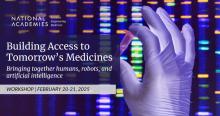Building Access to Tomorrow’s Medicines: bringing together humans, robots, and artificial intelligence - A Workshop
The National Academies of Sciences, Engineering, and Medicine will host a workshop exploring the transformative potential of artificial intelligence (AI) and machine learning (ML) in chemical sciences and drug discovery. Sponsored by the Chemical Sciences Roundtable, this event will bring together researchers, policymakers, and stakeholders to examine how AI tools can address data biases and democratize pharmaceutical research, potentially reducing drug development costs down from billions of dollars and decades of work.
